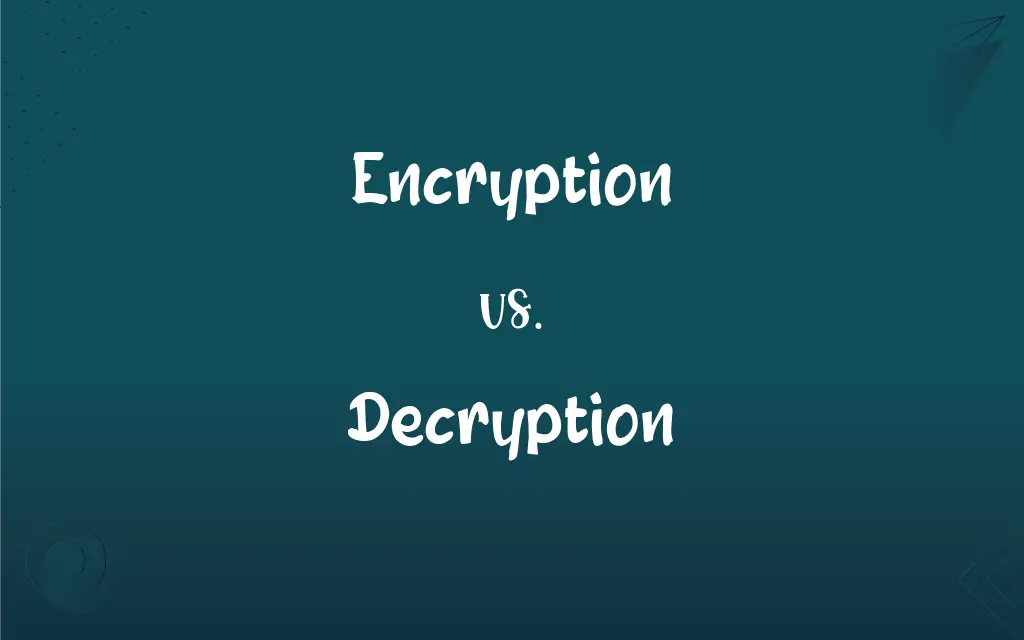Encryption vs. Decryption: What's the Difference?
Edited by Janet White || By Harlon Moss || Updated on October 13, 2023
Encryption is converting plain text into secret code, while decryption is converting secret code back into plain text.

Key Differences
Encryption and decryption are vital processes in cryptography. Encryption involves converting original, readable data (plain text) into an unreadable format, called cipher text, using an algorithm and an encryption key. Contrarily, decryption is the process of transforming this unreadable cipher text back into its original format using a decryption key. Both of these processes are fundamental in ensuring the confidentiality and integrity of data in communication and storage.
The importance of encryption and decryption in cybersecurity cannot be overstated. Encryption safeguards data by making it indecipherable to unauthorized users, ensuring that sensitive information, such as passwords and personal messages, remains confidential. On the other hand, decryption is equally critical as it allows authorized recipients to retrieve and understand the original information, maintaining the utility and value of the encrypted data.
In the realm of digital communication, both encryption and decryption are instrumental. Encryption provides a means for information to be transmitted securely over unsecured networks, protecting it from potential eavesdroppers and malicious actors. Decryption, however, ensures that the recipient on the other end can revert the data back to a usable form, facilitating secure and private communication between parties.
The mechanics of encryption and decryption involve complex algorithms and keys. When data is encrypted, an algorithm scrambles it according to a specific key, rendering it unreadable to anyone without the corresponding decryption key. Conversely, decryption uses either the same key (symmetric encryption) or a mathematically related key (asymmetric encryption) to unscramble the data, translating it back into its original format.
It's worth noting that both encryption and decryption are governed by cryptographic standards and protocols to ensure robust security. Encryption seeks to shield data from unauthorized access, while decryption seeks to make it accessible again, but only to those with the proper credentials. Striking a balance between robust encryption and efficient decryption is pivotal to maintaining security while ensuring utility.
ADVERTISEMENT
Comparison Chart
Process Objective
Converts plain text to cipher text
Converts cipher text to plain text
Key Usage
Utilizes an encryption key
Employs a decryption key
Accessibility
Makes data inaccessible to unauthorized users
Makes data accessible to authorized users
Security Role
Prevents unauthorized data access
Enables authorized data access
Outcome on Data Readability
Renders data unreadable
Restores data to a readable state
ADVERTISEMENT
Encryption and Decryption Definitions
Encryption
Encryption disguises data in such a way that only a recipient with the correct key can access the original information.
Sarah sent an encrypted email to protect the contents from potential hackers.
Decryption
Decryption is the reversal of encryption, converting scrambled data back into its original form.
Without decryption, the receiver cannot comprehend the encrypted message sent by the sender.
Encryption
Encryption is the process of converting information into a secret code to prevent unauthorized access.
The company implements encryption to protect sensitive customer data.
Decryption
Decryption is the process that transforms encrypted, unreadable data back into its original, accessible state.
The IT team uses decryption to access the contents of encrypted files securely.
Encryption
Encryption involves using algorithms and keys to scramble data into an unreadable format.
Secure websites use encryption to safeguard your credit card information during transactions.
Decryption
Decryption involves using a key to unscramble encrypted data, making it readable and accessible again.
The agent performed decryption on the secret message to reveal the hidden instructions.
Encryption
Encryption serves to safeguard data during transmission over networks, ensuring it cannot be intercepted and read.
Encryption is crucial for protecting communication within secure military networks.
Decryption
Decryption allows authorized parties to access and understand data that has been secured via encryption.
Without the right decryption key, the secured files remained inaccessible to the team.
Encryption
Encryption allows confidential storage and transmission of data by rendering it inaccessible without the appropriate key.
Hospitals use encryption to secure patient records and ensure privacy.
Decryption
Decryption restores the utility of data by reverting it back from an encrypted state to its original format.
Decryption of the transmitted data was essential to understand the critical message conveyed securely.
Encryption
The process or result of encrypting data.
Decryption
To decipher.
Encryption
Cryptography.
Decryption
To decode.
Encryption
(cryptography) The process of obscuring information to make it unreadable without special knowledge, key files, or passwords.
Decryption
A deciphered or decoded message.
Encryption
(cryptography) A ciphertext, a cryptogram, an encrypted value. Usually used with the preposition "of" followed by the value that is hidden in it.
Decryption
The process reversing an encryption, i.e. the process which converts encrypted data into its original form.
Encryption
The process of converting messages in ordinary language, or other information into a secret coded form that cannot be interpreted without knowing the secret method for interpretation, called the key.
Decryption
The activity of making clear or converting from code into plain text;
A secret key or password is required for decryption
Encryption
The activity of converting from plain text into code
FAQs
Why is encryption important?
Encryption is important to protect data from unauthorized access and maintain privacy and security.
When is decryption used?
Decryption is used to convert encrypted data back to its original form for authorized access and readability.
What is an encryption key?
An encryption key is a piece of information used in the encryption process to convert plain text into cipher text.
What is encryption?
Encryption is the process of converting plain text into cipher text to prevent unauthorized access.
Is decryption safe?
Decryption is safe when handled properly, ensuring only authorized parties have access to the decryption key.
Is encryption secure?
While encryption significantly enhances security, it may not be absolutely secure against all potential threats.
What is end-to-end encryption?
End-to-end encryption ensures data is encrypted on the sender’s side and only decrypted by the intended recipient.
What does decryption mean?
Decryption means converting encrypted data (cipher text) back into its original form (plain text).
Can decryption occur without a key?
Normally, decryption cannot occur without the appropriate key, as it is needed to revert encrypted data to its original state.
How does decryption ensure data utility?
Decryption ensures data utility by converting unreadable encrypted data back into its usable, original form.
What is symmetric encryption?
Symmetric encryption is a method where the same key is used for both encryption and decryption processes.
How does decryption work in asymmetric encryption?
In asymmetric encryption, decryption is performed using a private key that is different from the public encryption key.
What tools are used for decryption?
Decryption tools include cryptographic algorithms and keys, which can be implemented through software or hardware solutions.
What is a decryption key?
A decryption key is used to decode encrypted data, converting it back into its original, readable format.
Can encryption affect data integrity?
Encryption does not affect data integrity but ensures it by securing data against unauthorized access and tampering.
How does encryption affect performance?
Encryption can introduce latency as data must be converted to cipher text, potentially impacting system performance slightly.
Is encryption always necessary?
Encryption is typically necessary when dealing with sensitive, personal, or confidential data requiring protection.
What data can be encrypted?
Virtually any form of data, including text, images, and files, can be encrypted to enhance its security.
Can decrypted data be encrypted again?
Yes, decrypted data can be re-encrypted to maintain its security during subsequent transmissions or storage.
How is decryption key management handled?
Decryption key management involves securely generating, storing, distributing, and retiring keys to prevent unauthorized access.
About Author
Written by
Harlon MossHarlon is a seasoned quality moderator and accomplished content writer for Difference Wiki. An alumnus of the prestigious University of California, he earned his degree in Computer Science. Leveraging his academic background, Harlon brings a meticulous and informed perspective to his work, ensuring content accuracy and excellence.
Edited by
Janet WhiteJanet White has been an esteemed writer and blogger for Difference Wiki. Holding a Master's degree in Science and Medical Journalism from the prestigious Boston University, she has consistently demonstrated her expertise and passion for her field. When she's not immersed in her work, Janet relishes her time exercising, delving into a good book, and cherishing moments with friends and family.































































